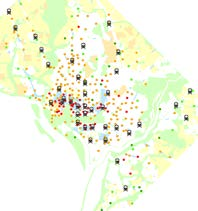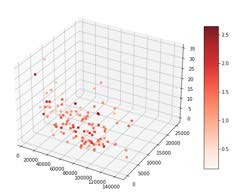Due to the wide-ranging travel restrictions and lockdowns applied to limit the diffusion of the SARS-CoV2 virus, the coronavirus disease of 2019 (COVID-19) pandemic has had an immediate and significant effect on human mobility at the global, national, and local levels. At the local level, bike-sharing played a significant role in urban transport during the pandemic since riders could travel outdoors with reduced infection risk. However, based on different data resources, this non-motorized mode of transportation was still negatively affected by the pandemic (i.e., relative reduction in ridership). This study has two objectives: 1) to investigate the impact of the COVID-19 pandemic on the numbers and duration of trips conducted through a bike-sharing system - the Capital Bikeshare in Washington, DC, USA; and 2) to explore whether land use and household income in the nation's capital influence the spatial variation of ridership during the pandemic. Towards realizing these objectives, this research looks at the relationship between bike sharing and COVID-19 transmission as a two-directional relationship rather than a one- directional causal relationship. Accordingly, this study models i) the impact of COVID-19 infection numbers and rates on the use of the Capital Bikeshare system and ii) the risk of COVID-19 transmission among individual bike-sharing users. In other words, we examine i) the cyclist's behavior as a function of the COVID-19 transmission evolution in an urban environment and ii) the possible relationship between the bike share usage and the COVID-19 transmission through adopting a probabilistic contagion model. The findings show the risk of using a bike-sharing system during the pandemic and whether bike sharing remains a healthier alternative mode of transportation in terms of infection risk.
翻译:由于对旅行的限制和限制SARS-COV2病毒传播的封锁范围很广,2019年的冠状病毒(COVID-19)大流行对全球、国家和地方各级的人类流动产生了直接和重大的影响。在地方一级,在大流行病期间,自行车共享在城市交通中起着重要作用,因为骑手可以到户外旅行,感染风险降低。然而,根据不同的数据资源,这种非机动交通方式仍然受到该大流行病的负面影响(即骑车的机率相对下降)。这项研究有两个目标:1)调查COVID-19大流行对通过自行车共享系统(美国华盛顿特区的Capital Bikeshare)进行的旅行次数和持续时间的影响。2)探讨在大流行病期间,由于骑车者可以到户外旅行,造成感染风险减少,因此,为了实现这些目标,这种非机动车共享和COVI-19输电传输作为双向关系,而不是以一向方向分享D大流传输机率,因此,在使用COVI的机路路路段和电路路段之间可能发生的风险。








